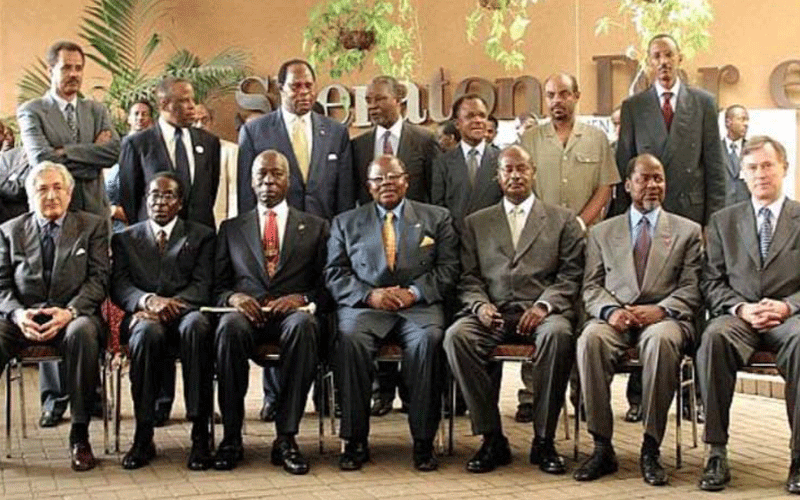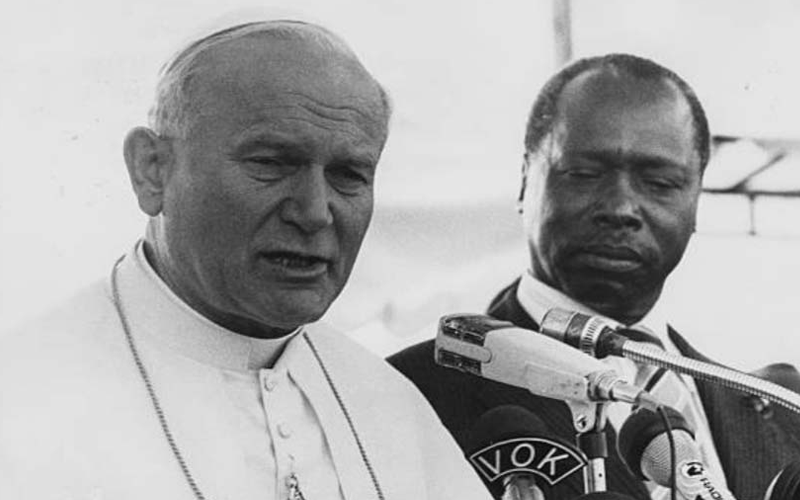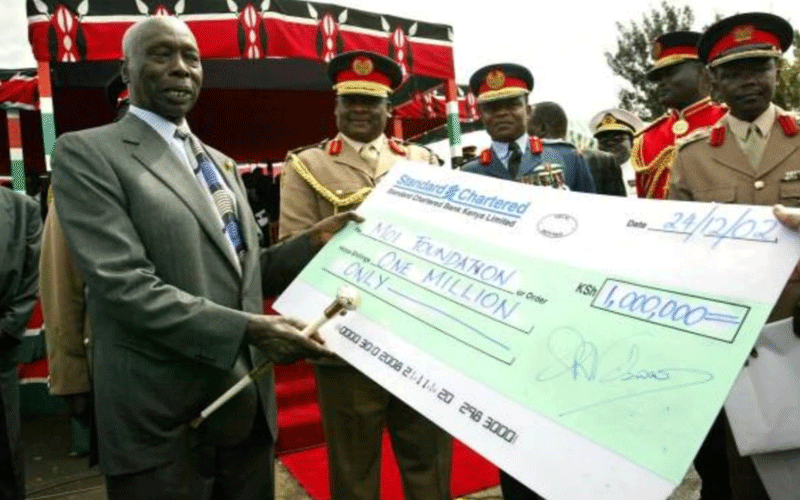The Sambilis: Enduring symbol of ex-president’s generosity, kindness
By Noah Cheploen, February 12, 2020
Noah Cheploen @cheploennoah
Dr Edward Sambili and his wife Prof Hellen Sambili are a perfect and enduring symbol of the late retired President Daniel arap Moi’s unwavering love for education as well as his caring and generous heart.
Not only did Moi care for the couple since their days as students at the University of Nairobi in the early 1980s by giving them jobs and scholarships to study in Britain up to PhD level, he also placed the couple’s children under his wings.
In an in-depth interview with the People Daily, Dr Sambili narrated how he first saw Moi (in person) in 1973 when the latter held a public baraza at their Emining village.
It was a short meeting but Moi’s speech changed the course of his life completely.
“He said something that I really liked… he told people and one person, in particular who owned a ‘club’, to close it because there was nothing good in alcohol,” said Sambili.
“Moi told him: ‘If you think selling alcohol is profitable show me the Rolls Royce that you have bought from the proceed,’” the former Planning Permanent Secretary and Central Bank Deputy Governor recalls how the ‘culprit’ recoiled in shame.
As fate would have it, Sambili met Moi again while he was a Form Two student at Alliance High School, courtesy of the then Baringo South MP Edward Kiptanui, a key ally of Moi, who drove with him to Moi’s Kabarnet Residence one afternoon.
“Kiptanui used to pay my fees and that is why I was with him that afternoon,” he recalls.
Slaughter bull
“After I cleared Form Four, I was admitted to UoN for an Education course, but I didn’t like it because my heart was in commerce so I asked Kiptanui to talk to Mzee (who was by then the President) to change it for me,” he says.

“But Mzee said No, No, No, that cannot happen… teaching is the best career. How can he leave?” says Sambili, adding that his hopes for studying a business course were dashed.
This was the beginning of a long journey with Moi, which culminated in him being appointed principal of Moi High School, Kabarak for a period of five years, Deputy Governor, Central Bank of Kenya, as well as Planning PS, a position he held for eight years.
Sambili was also the founding chairman and the brains behind the establishment of Kabarak University — another Moi pet project.
His wife Hellen had been posted to a school in Western Kenya and because they had a two-week-old baby, the young father helped her get a place at Kabarak where she taught biology.
“That was around 1983 and I was teaching economics and math,” he recalls.
At Kabarak, the principal used to take teachers periodically to meet Mzee Moi at his residence where he would introduce new teachers and also update him on any other matter concerning the school.
“When he reached me, Moi said: ‘ I know this one. He is a mathematician… I know him’,” he says, adding that was the moment his relationship with Moi deepened.
“He used to give every teacher free milk every day… you just send somebody to his dairy farm for at least one litre of milk every evening. There was also space for every teacher to grow vegetables,” he says.
“Moi also used to slaughter a bull and share with teachers monthly; we would just be notified and off we went to collect our share.

After the closing ceremony, he invited us to his residence for a small party where he also gave us some small allowance as a reward for a job well done. That was the moment I realised Mzee was a kind person,” says Dr Sambili.
And, because he had performed very well at the UoN, he soon got a scholarship from Ford Foundation to study International Trade and Development at Lancaster University.
It was at this point that Moi’s generosity came to the fore again.
“A missionary friend asked me what was going to happen to my young family. I told him they would stay here and wait for me until I come back but he said No. As a Christian I could not leave my family behind,” he recalls.
Maintain contact
“One day while I was walking with my wife in the school, Moi’s convoy stopped and I gathered courage and asked him to help give my wife a scholarship so that we could go together,” says Sambili.
“He (Moi) smiled and said that’s OK…”
A few days later they were on their way to the airport with their two little babies–– a girl and a boy–– with the government having given his wife a full scholarship.
“Money was not a problem because both of us had gotten full scholarship which came with stipends,” he says.
From an early stage, Moi wanted Sambili to take over as Kabarak’s deputy because of his outstanding personality. However, Sambili soon moved out of Kabarak for greener pastures leaving Hellen behind.

“I got a job at Egerton University as a lecturer but I maintained contact with Mzee,” he says.
Once again, Egerton University offered him a scholarship to Cambridge for a PhD and when Moi got wind of it he gave Hellen a scholarship and off they went to the UK.
Then in another stroke of generosity, Mzee Moi bumped into Sambili’s wife Hellen in Kabarak and immediately asked her where he was.
“Immediately she told him that I was in Lancaster, he prepared another scholarship for her and she joined me again,” he said, adding that they stayed there for four years.
Armed with PhDs, the Sambilis moved to Egerton University as lecturers.
“One day, at around 11pm, my colleague Dr Daniel Tuitoek knocked at my door together with his wife Prisca with a message that Mzee wanted to see me immediately,” he adds.
Learn a lot
“There were no phones those days but my colleague had the landline and I called back… after a few attempts Mzee came on the line and said he wanted to see me as soon as possible. When I met him, two days later, he told me he wanted me to become the headmaster for Kabarak… I soon left my job at Egerton and went to Kabarak.
At the time, Sambili had just gotten a job as the Executive Director for Kenya School of Monetary Studies and was to report on Tuesday but Moi had called him on Saturday.
“My direction changed. I went to Kabarak and got to work closely with Mzee. I learnt a lot of things from him such as punctuality,”
Sambili recalls that Moi was so zealous about his Kabarak farm that he was involved even in the minute details of management.
“He would wake up by 6am and go round the farm… it was a very enriching experience…” everything you see at Kabarak including landscaping it was his ideas. He had a five-acre tree seedling nursery,” he said.
Sambili says his best moment at Kabarak was the time he helped Moi establish Kabarak University with Dr Tuitoek and his wife.
Moi was to call him again—after he had joined Central Bank—after establishment of Kabarak University stagnated.
Sambili adds that Moi helped educate his daughter at Cambridge University.
“Many Kenyans never got to know Moi. He was an amazing person. A wonderful man and I can tell you we will never get another kind person in 100 years,” he says.